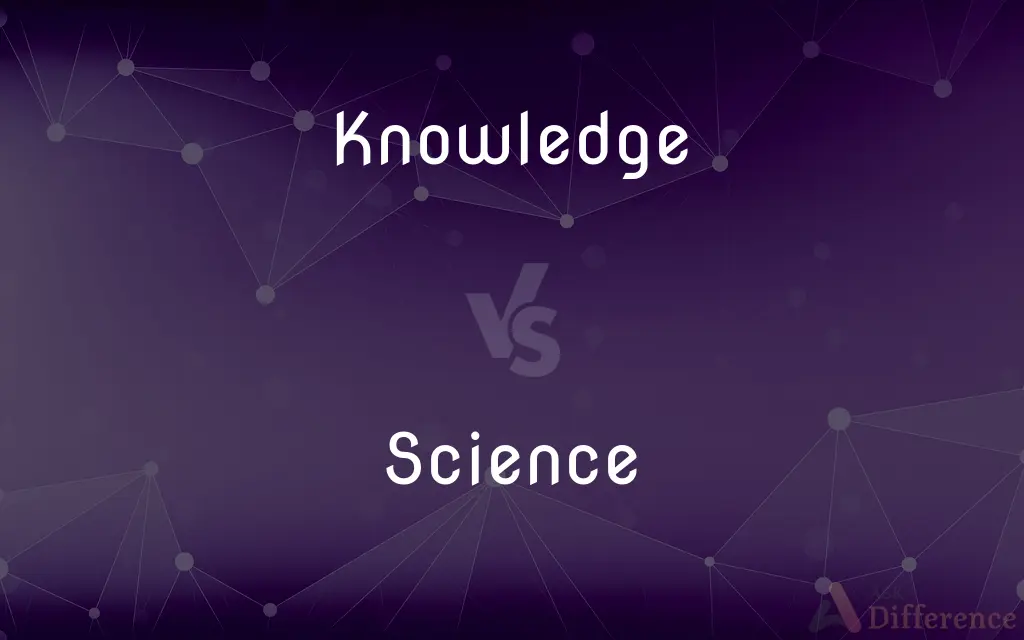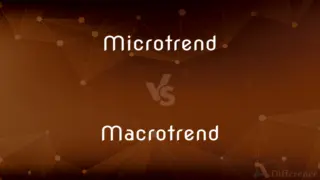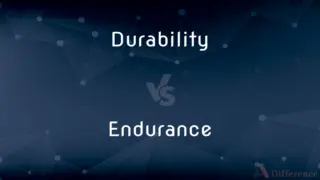Knowledge vs. Science — What's the Difference?
By Tayyaba Rehman & Maham Liaqat — Updated on March 10, 2024
Knowledge is the information, understanding, and skills gained through experience or education, while science is a systematic enterprise that builds and organizes knowledge in the form of testable explanations and predictions about the universe.

Difference Between Knowledge and Science
Table of Contents
ADVERTISEMENT
Key Differences
Knowledge encompasses a broad spectrum of information, understandings, and skills that individuals acquire through experience, education, and the process of learning. It can be theoretical or practical and covers various fields, from art and literature to mathematics and ethics. Science, on the other hand, is a specific domain of knowledge that employs a systematic methodology based on evidence. It involves the observation, identification, description, experimental investigation, and theoretical explanation of phenomena.
Knowledge allows individuals to make sense of the world, solve problems, and make informed decisions. It can be subjective, varying from person to person based on their experiences and interpretations. Science aims to produce universal principles and laws that explain the natural and physical world. It relies on empirical evidence, peer review, and replicability to validate its theories and findings.
While knowledge can be personal, intuitive, or cultural, science seeks objective and verifiable truths through rigorous methods. Knowledge may come from various sources and may not always be subject to empirical testing, whereas science demands evidence and reproducibility as central tenets.
Both knowledge and science are essential for the advancement of society, but they play different roles. Knowledge encompasses the totality of human understanding and skills, including but not limited to scientific understanding, while science is a methodical approach to extending knowledge about the universe through testable means.
Knowledge is a broad concept that includes all that has been perceived, discovered, or learned, encompassing both subjective and objective elements. Science is a systematic approach within the domain of knowledge focused on discovering objective truths about the natural world through empirical evidence and experimentation.
ADVERTISEMENT
Comparison Chart
Definition
Information, understanding, and skills acquired through experience or education.
A systematic enterprise that builds and organizes knowledge in testable explanations and predictions.
Nature
Can be subjective, intuitive, cultural, or empirical.
Objective, empirical, and based on testable evidence.
Scope
Broad, encompassing all areas of human understanding.
Focused on understanding the natural and physical world.
Methodology
Acquired through experience, education, reasoning, and perception.
Employs scientific methods, including observation, experimentation, and analysis.
Validation
Can be personal or communal, not always subject to empirical testing.
Requires empirical evidence, peer review, and replicability.
Compare with Definitions
Knowledge
A broad understanding that encompasses facts, information, and skills.
His knowledge of history is extensive.
Science
A disciplined way of studying the natural world through observation and experiment.
The science of biology explores living organisms and their interactions.
Knowledge
Acquired through experience, education, or learning.
She gained a deep knowledge of chemistry through her studies.
Science
Involves formulating hypotheses, conducting experiments, and drawing conclusions.
Scientists conduct experiments to test the validity of their hypotheses.
Knowledge
Varies among cultures and societies.
Traditional knowledge includes indigenous practices and wisdom.
Science
Aims to produce reliable, objective knowledge about how the world works.
Physics uses scientific methods to understand the laws of the universe.
Knowledge
Can be theoretical (know-why) or practical (know-how).
Practical knowledge in carpentry is valuable for hands-on work.
Science
Builds on previous findings and is subject to peer review.
His research added to the existing body of science on climate change.
Knowledge
Involves awareness or familiarity gained by experience.
Traveling provides knowledge about different cultures.
Science
Utilizes scientific methods to ensure reproducibility and reliability.
The experiment's results were replicated in multiple studies, confirming its reliability.
Knowledge
Knowledge is a familiarity, awareness, or understanding of someone or something, such as facts (descriptive knowledge), skills (procedural knowledge), or objects (acquaintance knowledge). By most accounts, knowledge can be acquired in many different ways and from many sources, including but not limited to perception, reason, memory, testimony, scientific inquiry, education, and practice.
Science
(Archaic) Knowledge, especially that gained through experience.
Knowledge
Facts, information, and skills acquired through experience or education; the theoretical or practical understanding of a subject
A thirst for knowledge
Her considerable knowledge of antiques
Science
Science (from Latin scientia 'knowledge') is a systematic enterprise that builds and organizes knowledge in the form of testable explanations and predictions about the universe.The earliest roots of science can be traced to Ancient Egypt and Mesopotamia in around 3000 to 1200 BCE. Their contributions to mathematics, astronomy, and medicine entered and shaped Greek natural philosophy of classical antiquity, whereby formal attempts were made to provide explanations of events in the physical world based on natural causes. After the fall of the Western Roman Empire, knowledge of Greek conceptions of the world deteriorated in Western Europe during the early centuries (400 to 1000 CE) of the Middle Ages, but was preserved in the Muslim world during the Islamic Golden Age.
Knowledge
Awareness or familiarity gained by experience of a fact or situation
The programme had been developed without his knowledge
He denied all knowledge of the incidents
Science
The observation, identification, description, experimental investigation, and theoretical explanation of phenomena
New advances in science and technology.
Knowledge
The state or fact of knowing
Humans naturally aspire to knowledge.
Science
Such activities restricted to a class of natural phenomena
The science of astronomy.
Knowledge
Familiarity, awareness, or understanding gained through experience or study
Has great knowledge of these parts.
Has only limited knowledge of chemistry.
Science
A systematic method or body of knowledge in a given area
The science of marketing.
Knowledge
The sum or range of what has been perceived, discovered, or learned
The extraordinary knowledge housed in the library.
Science
(countable) A particular discipline or branch of learning, especially one dealing with measurable or systematic principles rather than intuition or natural ability.
Of course in my opinion Social Studies is more of a science than an art.
Knowledge
(Archaic) Carnal knowledge.
Science
Specifically the natural sciences.
My favorite subjects at school are science, mathematics, and history.
Knowledge
The fact of knowing about something; general understanding or familiarity with a subject, place, situation etc.
His knowledge of Iceland was limited to what he'd seen on the Travel Channel.
Science
Knowledge gained through study or practice; mastery of a particular discipline or area.
Knowledge
Awareness of a particular fact or situation; a state of having been informed or made aware of something.
Science
The fact of knowing something; knowledge or understanding of a truth.
Knowledge
Intellectual understanding; the state of appreciating truth or information.
Knowledge consists in recognizing the difference between good and bad decisions.
Science
(uncountable) The collective discipline of study or learning acquired through the scientific method; the sum of knowledge gained from such methods and discipline.
Knowledge
Familiarity or understanding of a particular skill, branch of learning etc.
Does your friend have any knowledge of hieroglyphs, perchance?
A secretary should have a good knowledge of shorthand.
Science
(uncountable) Knowledge derived from scientific disciplines, scientific method, or any systematic effort.
Knowledge
(philosophical) Justified true belief
Science
The scientific community.
Knowledge
(obsolete) Information or intelligence about something; notice.
Science
Synonym of sweet science
Knowledge
The total of what is known; all information and products of learning.
His library contained the accumulated knowledge of the Greeks and Romans.
Science
Obsolete spelling of scion
Knowledge
(countable) Something that can be known; a branch of learning; a piece of information; a science.
Science
To cause to become versed in science; to make skilled; to instruct.
Knowledge
(obsolete) Acknowledgement.
Science
To use science to solve a problem.
Knowledge
(obsolete) Notice, awareness.
Science
Knowledge; knowledge of principles and causes; ascertained truth of facts.
If we conceive God's sight or science, before the creation, to be extended to all and every part of the world, seeing everything as it is, . . . his science or sight from all eternity lays no necessity on anything to come to pass.
Shakespeare's deep and accurate science in mental philosophy.
Knowledge
The deep familiarity with certain routes and places of interest required by taxicab drivers working in London, England.
Science
Accumulated and established knowledge, which has been systematized and formulated with reference to the discovery of general truths or the operation of general laws; knowledge classified and made available in work, life, or the search for truth; comprehensive, profound, or philosophical knowledge.
All this new science that men lere [teach].
Science is . . . a complement of cognitions, having, in point of form, the character of logical perfection, and in point of matter, the character of real truth.
Knowledge
(obsolete) To confess as true; to acknowledge.
Science
Especially, such knowledge when it relates to the physical world and its phenomena, the nature, constitution, and forces of matter, the qualities and functions of living tissues, etc.; - called also natural science, and physical science.
Voltaire hardly left a single corner of the field entirely unexplored in science, poetry, history, philosophy.
Knowledge
The act or state of knowing; clear perception of fact, truth, or duty; certain apprehension; familiar cognizance; cognition.
Knowledge, which is the highest degree of the speculative faculties, consists in the perception of the truth of affirmative or negative propositions.
Science
Any branch or department of systematized knowledge considered as a distinct field of investigation or object of study; as, the science of astronomy, of chemistry, or of mind.
Good sense, which only is the gift of Heaven,And though no science, fairly worth the seven.
Knowledge
That which is or may be known; the object of an act of knowing; a cognition; - chiefly used in the plural.
There is a great difference in the delivery of the mathematics, which are the most abstracted of knowledges.
Knowledges is a term in frequent use by Bacon, and, though now obsolete, should be revived, as without it we are compelled to borrow "cognitions" to express its import.
To use a word of Bacon's, now unfortunately obsolete, we must determine the relative value of knowledges.
Science
Art, skill, or expertness, regarded as the result of knowledge of laws and principles.
His science, coolness, and great strength.
Knowledge
That which is gained and preserved by knowing; instruction; acquaintance; enlightenment; learning; scholarship; erudition.
Knowledge puffeth up, but charity edifieth.
Ignorance is the curse of God;Knowledge, the wing wherewith we fly to heaven.
Science
To cause to become versed in science; to make skilled; to instruct.
Knowledge
That familiarity which is gained by actual experience; practical skill; as, a knowledge of life.
Shipmen that had knowledge of the sea.
Science
A particular branch of scientific knowledge;
The science of genetics
Knowledge
Scope of information; cognizance; notice; as, it has not come to my knowledge.
Why have I found grace in thine eyes, that thou shouldst take knowledge of me?
Science
Ability to produce solutions in some problem domain;
The skill of a well-trained boxer
The sweet science of pugilism
Knowledge
To acknowledge.
Knowledge
The psychological result of perception and learning and reasoning
Common Curiosities
Can knowledge be non-scientific?
Yes, knowledge can be non-scientific, encompassing areas like art, literature, and personal or cultural beliefs that may not rely on empirical evidence.
Is all science considered knowledge?
Yes, all scientific understanding and discoveries are considered part of the broader realm of human knowledge, but not all knowledge is scientific.
What defines science?
Science is defined by its systematic approach to building and organizing knowledge about the universe through testable explanations, predictions, and empirical evidence.
How is scientific knowledge verified?
Scientific knowledge is verified through empirical evidence, experimentation, peer review, and the reproducibility of results.
What is knowledge?
Knowledge encompasses the information, understanding, and skills that an individual acquires through experience, education, or learning, covering a wide range of subjects and areas.
What role does intuition play in knowledge?
Intuition can play a role in knowledge by providing insights or understandings that are not derived from rational processes, though such knowledge may not be empirically verifiable.
How does scientific research build on existing knowledge?
Scientific research builds on existing knowledge by testing hypotheses within the framework of established theories, leading to new insights, discoveries, and the expansion of scientific understanding.
How does knowledge differ from science?
Knowledge is a broader concept that includes all types of understanding and skills, while science is a specific domain within knowledge that focuses on discovering truths about the natural world through systematic and empirical methods.
Can personal experiences be considered knowledge?
Personal experiences contribute to an individual's knowledge, adding to their understanding, skills, and perceptions, although this form of knowledge may be subjective.
How do cultures influence knowledge?
Cultures influence knowledge by shaping beliefs, practices, and understandings that are passed down through generations, contributing to the diversity of human knowledge.
Can scientific knowledge change?
Yes, scientific knowledge can change as new evidence emerges, leading to the refinement or revision of existing theories or the development of new ones.
What distinguishes practical knowledge from theoretical knowledge?
Practical knowledge (know-how) is related to skills and the application of knowledge in real-world tasks, while theoretical knowledge (know-why) involves understanding principles and theories that explain phenomena.
What is the role of peer review in science?
Peer review plays a critical role in science by ensuring that research is scrutinized by experts in the field, thereby maintaining the quality, credibility, and reliability of scientific knowledge.
What is the importance of empirical evidence in science?
Empirical evidence is crucial in science as it provides the objective basis for testing theories, validating results, and advancing scientific understanding.
How do science and knowledge contribute to society?
Science and knowledge contribute to society by enhancing our understanding of the world, informing decision-making, driving technological and medical advancements, and improving quality of life.
Share Your Discovery

Previous Comparison
Microtrend vs. Macrotrend
Next Comparison
Durability vs. EnduranceAuthor Spotlight
Written by
Tayyaba RehmanTayyaba Rehman is a distinguished writer, currently serving as a primary contributor to askdifference.com. As a researcher in semantics and etymology, Tayyaba's passion for the complexity of languages and their distinctions has found a perfect home on the platform. Tayyaba delves into the intricacies of language, distinguishing between commonly confused words and phrases, thereby providing clarity for readers worldwide.
Co-written by
Maham Liaqat















































